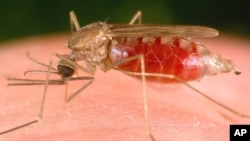Dozens of leading medical researchers marked World Malaria Day Wednesday with a special gathering at the U.S. Capitol in Washington, DC. They came to highlight the progress being made in efforts to prevent and treat malaria. Worldwide, the mosquito-borne illness claims more than 650,000 lives each year, the vast majority children in sub-Saharan Africa.
Despite these grim statistics, experts are hopeful that with new drugs, new vaccines and new prevention strategies, malaria will eventually be conquered.
The World Health Organization says one-third of the global population lives in malaria-endemic countries, where there were an estimated 216 million new cases last year caused by the bite of mosquitoes infected with malaria parasites.
David Bowen is head of the group Malaria No More, a not-for-profit organization devoted to raising public awareness of the disease in the United States and in Africa, where malaria kills one child every minute of every day.
“The idea of a child of ours or a child of a friend of ours dying is almost thankfully an unimaginable tragedy. And the fact that that happens once a minute across the world, principally in Africa, is almost impossible to conceive of and yet, that’s the fact,” Bowen said.
Malaria No More brought a group of 20 scientists to Capitol Hill to discuss their cutting-edge malaria research.
One of the researchers is Brian Grimberg, an assistant professor of international health at Case Western Reserve University in Cleveland, Ohio. His research has taken him to Papua New Guinea, where four of the five known types of malaria parasites are found. Grimberg's work is part of a $7.9 million dollar Case Western-led project, funded by the U.S. National Institutes of Health, to test new malaria therapies in Southeast Asia and the Southwest Pacific. The ultimate goal is to stop malaria’s deadly transmission not just in the Pacific but across Africa, Asia and Latin America.
“One of our lead ones is actually a leukemia drug, a [blood] cancer drug that was originally developed to treat different kinds of leukemia. And it turns out to be pretty effective against killing the [malaria] parasites,” Grimberg said.
Because the anti-cancer drug has already received the regulatory nod in the United States, Grimberg hopes it could be approved quickly as a malaria treatment, if the human trials prove successful.
Grimberg notes that resistance has now developed to all mainstay anti-malarial drugs, including the most potent treatment, artemisinin, which is derived from the sweet wormwood tree in China, and quinine, from the bark of a tree in Peru. He says those drugs were discovered by native populations.
So, Grimberg says researchers who are part of his project will also talk with locals to see if they can discover any new and more effective compounds.
“People who live in endemic areas with malaria have some sort of native treatment that they’ve developed or identified. And so we go in and take some of these plants, and we can extract the different compounds and see if they work. And one of the most interesting ones we found is from the island of Fiji, where there’s a sponge that grows just off the shore that people dive down and get it and dry it out, and then eat some of it whenever they feel they have malaria. It turns out to have three incredibly potent anti-malarial compounds in there,” Grimberg said.
Other research highlighted at the Washington gathering included the use of genetic engineering to prevent mosquitoes from becoming infected with the parasite in the first place, so they can’t spread it to humans.
Researchers at Virginia Commonwealth University in Richmond and Johns Hopkins University in Baltimore, Maryland, are using genetically modified bacterial viruses, known as phages, to produce a protein in the mosquitoes’ gut which blocks infection by the malaria parasite.
The mosquito ingests the phage from a piece of cotton soaked with a sugary solution, according to Luiz Shozo Ozaki, a VCU researcher who is spearheading the research.
“If the mosquito eats this phage, the phage will go through its gut where the malaria parasite develops and will block the parasite there,” Ozaki said.
Ozaki says a single genetically engineered viral phage produces thousands of inhibitor proteins against the parasite.
Ozaki hopes the use of biological tools, such as phages, along with ongoing efforts to develop novel treatments and much-needed vaccines, will lead to the elimination of malaria, one of the greatest public health scourges of all time.




